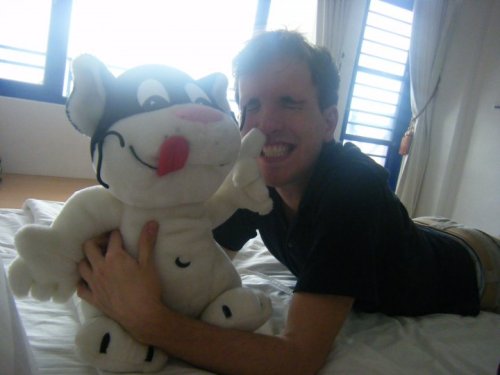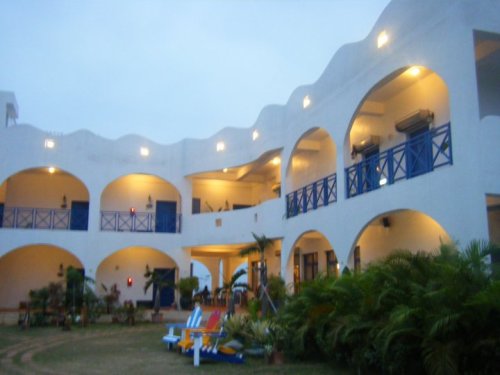A few weekends ago, Taiwanese Katherine and I went to Xiao Liu Chiu (小琉球), a small island off the southwest coast of Taiwan, for some rest and relaxation. Although we had hoped to go to the more beautiful Green Island, travel accommodations were difficult to arrange at the last minute. Like their Chinese and Japanese neighbors, Taiwanese love to travel. Even domestic tourist spots are booked up every nice weekend. Xiao Liu Chiu would have to do. And do it did.
We were picked up by a van service affiliated with our hotel. The driver picked up a few others and drove us the one hour to Donggan, a port town in Pingtung County. The town seems to serve two functions: unloading endless tonnage of fish and loading up regular ferries to Xiao Liu Chiu.
Looking at the giant fish market infrastructure, I was reminded of how much I take for granted the massive, complicated industries (plural) that keep my supermarkets and restaurants stocked. It’s easy to forget how much work goes into the clean, plastic-wrapped boneless chicken breast with the Perdue label, or the banana display in the fruit aisle.
American consumers are further removed from the farmers and fishermen than Taiwanese consumers. Taiwan grows a lot more of its own food locally, so if you live in rural Taiwan you probably know the guy who prepares the food for you, or at least the guy who sells it to you knows the guy who sold it to him (I sound like the narrator of A Bronx Tale: “I know a guy…”). Furthermore, Taiwanese shoppers want to see the unbutchered corpse when they buy meat. There’s little trust here for foam-packaged, far-from-the-farm, sterile-looking chops. Who knows how long it’s been sitting around?
There’s a definite irony here given that an animal hanging from a hook in an open air night market for eight hours isn’t likely to be any more sanitary than prepackaged chicken breast (it’s less sanitary). Taiwanese eateries, by and large, are not as clean as American eateries. Nonetheless, I’d wager Taiwanese shoppers know more about how the food they buy is produced than American shoppers. There’s good in that: Taiwanese take less for granted.
The problem with taking things for granted was highlighted by the ‘ferry’ ride Katherine and I took to Xiao Liu Chiu. Like most other people, I associate ‘ferry’ with a slow-moving sea vessel. A big horn honks and everyone takes pictures from the sides of the boat. Kids hang over the railing as mothers shout at them to be careful.
The Xiao Liu Chiu “ferry” was a gigantic speedboat. We were moving ridiculously quickly. I half-expected the captain to pound down the stairs holding a broke-in-half throttle in his hand, screaming “We’re gonna’ die!” (in Chinese). I did not know that “ferry” just denotes any sort of commercial vehicle that performs the action of “ferrying” people across a relatively small body of water.
One other little funny detail of the ferry trip that will be of special interest to the 20-somethings in the audience: I’ve noticed, and the ferry ride confirmed, that the latest fashion for young, upper-middle class Taiwanese kids is to wear layered pastel polo shirts with the collars proudly popped. It’s high comedy to me. I feel very lucky that this particular fashion trend took its sweet time crossing the Pacific. If only Justin Bieber’s music had moved as slowly.
We arrived in Xiao Liu Chiu twenty minutes after take-off (yes, take-off). Katherine was overjoyed because we moved too quickly for her to get sea sick. Our hotel picked us up at the pier, gave us a scooter and led us to our home for the night: Di Zhong Hai Hotel.
The most striking thing about our hotel was how out of place it seemed. The architecture comes straight out of Greece, with white and blue stucco walls, big, airy rooms and a blue dome atop the building. In case any lesser traveled visitors don’t get the reference, there’s a big Greek flag in the backyard. I was reminded of the glorious, unforgettable hours I spent sitting on a wall with a few of my old Oxford classmates watching the sunset in the middle of a small village in Santorini that was built into the side of a mountain.
Gesturing to Taiwanese tastes, there are stuffed animals everywhere, including three that were in our room. This was one of the weirder manifestations I’ve yet seen of the East Asian idealization of youth (for others see: Hello Kitty, or my long post about how Asian men love Asian women who do things to make themselves look fourteen). In our room there were two bodiless, pink heads called “Melody” and a black and white cat. In the restaurant there were about eight different stuffed things, including a giant teddy bear and an ice cream cone. The fountain/garden area was filled with stuffed animals, some of which lived in their own little wooden house (painted white and blue).
Taiwanese men’s idealization of youth may come with some pedophilic undertones, but Taiwanese women, Katherine included, just think stuffed animals are adorable. Nothing objectionable about that. As a good-will gesture, I sat for a mini-photo shoot with the many stuffed animals on campus. I will let you see one, maybe two of said photos. Don’t even bother requesting more.

Part of my multiyear series that a friend once dubbed something like "John's Misguided Love for Nose Picking Joke Pictures"
The hotel staff provided a lot more than just abundant stuffing. Our room was beautiful and it had an excellent balcony view of the Taiwan Strait. In addition, there was an afternoon tour of a nearby coral inlet, a nice dinner and a night tour of, among other places, a legendary cave.
When I hear a Taiwanese man tell Taiwanese women “it’s a very small tunnel, be careful,” I go into crisis mode. I define most doorways in Taiwan as “very small.” Would I be able to make it through this? To make matters worse, I wound up at the end of the line and had to navigate the tunnel without a flashlight.
A few challenging minutes later, I made it out of the tunnel thanks to some truly yogic body contortions. The guide looked mildly surprised when I made it out alive, which didn’t really endear him to me.
The cave he took us to had the same amount of floor space as my apartment’s medium-sized living room, and the ceilings were maybe five feet from the ground. The guide sat us down and shared some boring geological facts before getting to the juicy history.
In the seventeenth century, dozens of aboriginals lived in the tiny cave. None of us could imagine how so many folks fit into such a tiny place, even given the news that they were dwarves. The aboriginals resented the encroachment of Dutch traders on Xiao Liu Chiu. They attacked and murdered a few Dutchmen. The Dutch, full of enlightened clemency, decided to throw fire into the cave and block the exits. Roasted aboriginal. Obviously the Dutch were not yet apprised of proper counterinsurgency strategy.
I was tempted to repeat the Dutch technique on the guide when the guide informed us that in order to exit the cave we’d have to crawl for thirty minutes through an even smaller tunnel. Muttering some pretty vile things under my breath, I ducked down and steeled myself for a miserable trip down what I already had dubbed the Tunnel of Tears.
Fifteen seconds later I emerged into open air. Jerk.
After we returned to the hotel, Katherine and I greeted our three, stuffed roommates, showered and settled in. Then the Macy’s fireworks display began.
To put it mildly, Taiwan has lax fireworks laws. Pretty much any person of moderate maturity can buy whatever fireworks they please. A band of merrymakers staying at the hotel next door must have spent thousands of USD buying an entire silo of fireworks. I’m not talking dorky sparklers. I’m talking big, three hundred feet high, huge, bright explosion fireworks.
Katherine and I watched the show fifty yards away on our balcony as the producers stood silently, smoking cigarettes, admiring their work. I almost always enjoy fireworks. I find it funny that all human beings, some more than others (Chinese more than any others), like to watch bright things blow up. We’re a much more empathetic, cooperative species than we were ten thousand years ago, but we can’t get over the allure of bright, shiny, controlled explosions. The odds are slim I’ll ever again be so close to a fireworks spectacular.
The next day Katherine and I drove around Xiao Liu Chiu checking out the sites. My favorite stop was a three-quarter of a mile walking path carved out of one of the island’s tropical forests. Taiwanese like Katherine are accustomed to the beautiful, furious growth of the predatory banyan tree, but my American ecological expectations are always wonderfully overturned by the banyan. Katherine gamely followed me on every little silly side path I wanted to walk in order to see more than what the short path allowed. My knowledge of tropical plant growth is too slim to make much hay of this, but my enthusiasm is great. I look forward to bringing my much more knowledgeable sister along on a tropical forest walk. Maybe I can blog about it intelligently, or even have her guest blog it, after that experience (which I’ve already planned and will try to pass off to her as something she’s free to decide!).
Our last morning and afternoon in Xiao Liu Chiu were spent at the beach. I reconnected with my inner nine-year-old and built a sand castle, complete with a moat. The most memorable part of the day was when a stupid girl accidentally threw a rock into my jaw. She was trying to hurl it into the ocean yet released the rock ninety degrees too late. I know it sounds misogynistic, but I think ‘stupid girl’ is the appropriate term. How many young men misfire so egregiously? On a related note, I’d like to thank all the mouthy friends I’ve had in the Bronx for dragging me into enough fist fights that my jaw was conditioned to tolerate such a blow. I shrugged it off, cleaned the cut and enjoyed the rest of my stay.
My weekend in Xiao Liu Chiu confirmed what an old boss once told me. Every year he would spend half of his vacation at his summer house on the East coast, and the other half he would spend exploring a new, foreign city. Traveling to a vibrant, interesting city is fun, but it’s not restful. Traveling to the same old place may not titillate, but it’s very restful. My boss planned to experience the best of both types of travel: the stimulating and the relaxing. He believes such balance is perfect. I agree. I hope someday I’ll have the resources to emulate him.




